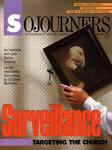Eight-year-old Allan Boesak Jr. was lifted up onto a chair so he could see over the large podium in the Georgetown University auditorium in Washington, D.C. His eyes were big and bright, and he grinned broadly as the crowd in the filled-to-capacity hall gave him a thunderous standing ovation. "My daddy is not afraid of the South African government," proclaimed the young boy, "and neither am I!"
Dorothy Boesak and her son were in town on November 20, 1985, to accept the 2nd annual Robert F. Kennedy Human Rights Award on behalf of husband and father Allan Boesak, who was denied a passport by the South African government. Winnie Mandela and Beyers Naude also received the award, but only Naude was able to attend the ceremony.
After young Allan finished his brief speech, Dorothy offered her own words of thanks before reading the words Allan Sr. had prepared for the occasion. Many of Allan's friends were in the audience that' day, and he was truly missed. Dorothy was radiant, and my reunion with her was a great delight.
This was my first occasion to see Allan Jr., though his proud parents had often told me about him. The pride and courage of that little boy was even more evidence to me of the inevitability of freedom for South Africa. It was a moment that will no doubt be vividly etched in the memory of Allan Jr. for the rest of his life. I know I won't soon forget it.
Sitting there, I recalled a conversation with Allan and Dorothy two years before in August 1983. Allan was in town to speak at the 20th Anniversary March on Washington, which commemorated the historic 1963 march in which Dr. Martin Luther King Jr. made his "I Have A Dream" speech. Dorothy had joined Allan for the trip, and it was her first visit to the United States. After all the activities ended, Allan, Dorothy, and I spent a day together. I remember it as a very personal and special time.
In particular, I remember a conversation we had about their children and the tremendous cost paid by the Boesak family because of Allan's work. Dorothy spoke of how hard it was that Allan had to be away so much because of his many commitments and how the exhausting pressures and demands on him affected the family. They both spoke of the death threats they had received.
"We get more threats now in a month than we used to in a whole year," said Allan. Dorothy painfully shared the kind of threats that are hardest for her: "The phone rings, and the voice on the other end says, 'We know the route your children take to school.' Then they describe in detail the way my children go. 'And we know the route they take home too,' and then they again give me the details to make sure I know that they have been watching my children. Then the voice says, 'Someday, if your husband doesn't stop speaking out, we are going to take your children.'"
She was crying as she finished the story, her voice trembling with fear. Allan buried his head in his hands, not knowing what he could say to comfort her and obviously torn by the same fear himself. We talked and then prayed together. It seemed like the only adequate response.
You see, Allan Jr.'s daddy and mommy are afraid sometimes. But their courage comes in refusing to be ruled by the fear or allowing the many threats to silence or stop them.
WITH TEARS IN MY eyes, I watched Allan Jr. stand up to speak for his father in Washington, D.C. The youngest of the Boesak children, he stands alongside his mother and father in their struggle to set South Africa free. South Africa is ruled by a government that threatens, arrests, attacks, and kills children; but now, all over the country, even the children are rising up to demand their freedom.
While all eyes were on Allan Jr. during his speech, I looked at Dorothy. A mother who had often feared for her son's life was now beaming with joy and pride. I can imagine what Allan Sr. would have felt at that moment too.
Allan was imprisoned for more than four weeks this fall, and at his May trial he will face serious charges that could result in a long jail term. Yet I'm sure Dorothy and Allan Jr. returned home with wonderful stories, love from many friends, and renewed hopes. I would have loved to have seen Allan's face as his son told him what happened in Washington.
The now-familiar strains of a South African anthem could be heard on that day in the crowded university lecture hall—"Freedom Is Coming." Allan Boesak Jr. smiled from ear to ear.
Jim Wallis is editor-in-chief of Sojourners.

Got something to say about what you're reading? We value your feedback!
